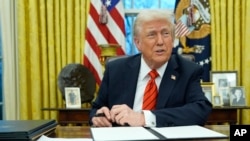A U.S. judge kept his block on President Donald Trump's buyout plan for federal employees in place on Monday while he considers whether to impose it for a longer period of time.
The decision by U.S. District Judge George O'Toole in Boston prevents Trump's administration from implementing the buyout plan for now, giving a temporary victory to labor unions that have sued to stop it entirely.
More than 2 million federal civilian employees had faced a midnight deadline Monday to accept the proposal. It is unclear when O'Toole will rule on the request by the unions.
The buyout effort is part of a far-reaching plan by Trump and his allies to reduce the size and rein in the actions of the federal bureaucracy. Trump, who returned to the presidency on Jan. 20, has accused the federal workforce of undercutting his agenda during his first term in office, from 2017 to 2021.
Unions have urged their members not to accept the buyout offer — saying Trump's administration cannot be trusted to honor it — but about 65,000 federal employees had signed up for the buyouts as of Friday, according to a White House official.
Reuters has been unable to independently verify that number, which does not include a breakdown of workers from each agency.
The offer promises to pay employees their regular salaries and benefits until October without requiring them to work, but that may not be ironclad. Current spending laws expire on March 14, and there is no guarantee that salaries would be funded beyond that point.
At a court hearing, U.S. Justice Department attorney Eric Hamilton called the buyout plan a "humane off-ramp" for those frustrated by Trump's decision to reduce the size of the workforce and end the ability of many of them to work from home.
But a lawyer for the unions said the plan had been carried out in a "slap dash" fashion with little regard to how it might disrupt operations at agencies such as the Department of Veterans Affairs.
"They failed to consider the continued functioning of government," lawyer Elena Goldstein said.
The administration had initially proposed a deadline of last Thursday before O'Toole, an appointee of Democratic former President Bill Clinton, extended it so he could consider the case.
Trump has tasked Tesla CEO and SpaceX founder Elon Musk, the world's richest person, with overseeing the purge of federal employees through his Department of Government Efficiency, which is not an actual government agency.
Musk's actions have sown panic among federal workers and prompted public protests. His actions also have led to a flood of calls to U.S. lawmakers by voters worried about the access that Musk's team has been given to sensitive information in government computer systems that contain data on federal payments to Americans and personal details of federal workers.
Several lawsuits
The unions and Democratic attorneys general have brought lawsuits challenging Trump's rapid remaking of government and won some initial victories.
A union that represents Consumer Financial Protection Bureau workers has filed a lawsuit seeking to block acting chief Russell Vought's move to suspend CFPB activities, one of several legal challenges that Trump's administration now faces.
Democratic attorneys general from 22 U.S. states filed a lawsuit on Monday in Boston challenging sharp cuts to federal grant funding for universities, medical centers and other research institutions by the Trump administration.
An effort to hollow out the U.S. Agency for International Development is partially on hold after a judge's ruling.
Trump's effort to freeze trillions of dollars in federal loans, grants and other financial assistance has also been paused in a separate case. A federal judge in Rhode Island on Monday ruled that the administration must restore all domestic funding while he considers the case.
On Saturday, a judge temporarily blocked Musk's entity from accessing government systems used to process trillions of dollars in payments at the Treasury Department.





